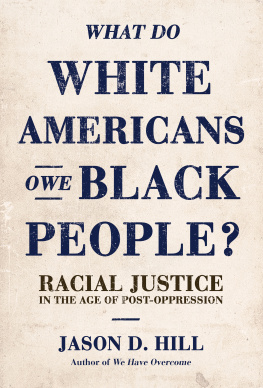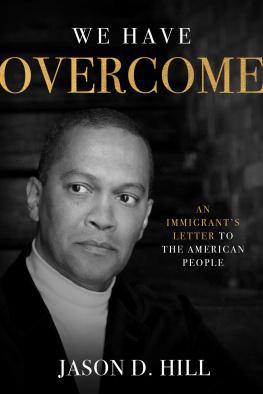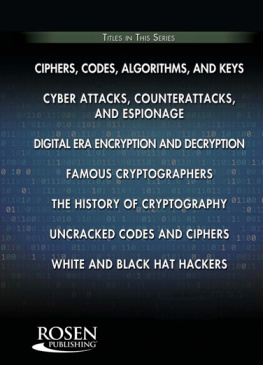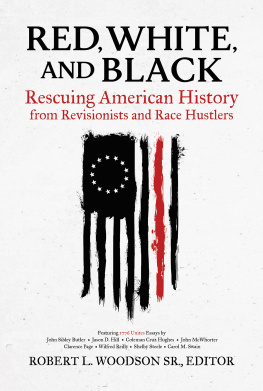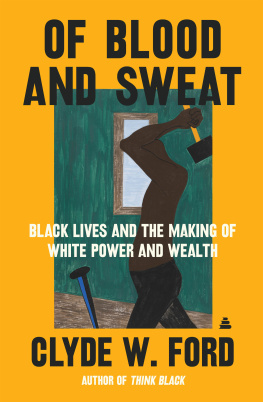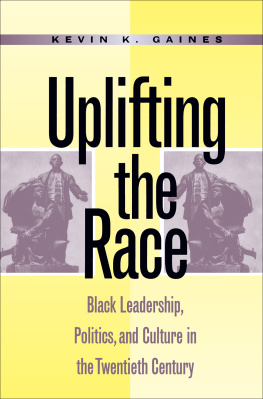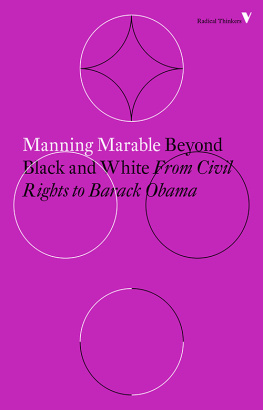Advance P raise for
What Do White Americans Owe Bla ck Pe ople?
One of the boldest living thinkers, Jason D. Hill, takes a sledgehammer to everything weve been taught about race and race relations. Written with grace and clarity, What Do White Americans Owe Black People? offers a compelling, unifying vision that moves us beyond the current racial hysteria. It should be mandatory reading for every single A mer ican.
Dr. Peter Boghossian , Author of How to Have Impossible Con versat ions
In his latest courageous contribution, Jason Hill rebuts the arguments that white Americans owe reparations to African Americans. Enslavement, he argues, was not a peculiar crime perpetrated by whites against blacks but a commonplace outcome when Europeansand Arabsencountered sub -S aharan societies where slave labor was the norm. In stark contrast to the tragic fate of the Africans shipped to the New World colonies, the American Founding posited a revolutionary idea of liberty for all men, though it took two more foundingsthe Civil War and Civil Rightsto fulfill that promise for the descendants of slaves in the United States. Tragically, Hill argues, the achievement was swiftly undermined by well -i ntentioned but destructive welfare policies and the race -c onscious ideology that produced both Black Power and Black Lives Matter. This is a boldand at times, startlingintervention in one of the most contentious debates of o ur time.
Niall Ferguson , Milbank Family Senior Fellow, The Hoover I nstitu tion
Names like Ta -N ehisi Coates, Ibram X. Kendi, and Nikole Hannah -J ones have come to dominate the debate over slavery reparations and social inequality. Jason Hills new book demonstrates why theirs should not be the final word. What Do White Americans Owe Black People? lays out both the philosophical and practical problems with the concept of inherited guilt. Moreover, it uses facts and logic to expose the sloppy arguments that often pass for deep thinking about race in Americ a t oday.
Jason L. Riley , Wall Street Journal columnist and autho r of Maverick: A Biography of Thomas Sowell
In the grand fashion of Thomas Sowell and in keeping with his previous work, We Have Overcome , Jason Hill starts from the philosophical premises of identitarian groupthink, details the lethal consequences if ones concern is a free society, and equips the reader with the intellectual weaponry to combat the neo -M arxists ideology. Jason doesnt just issue the cri de cur, The individual must rise. He leads by example. Jasons life, the clarity of his thinking, and his moral courage make his work an indispensable part of any serious discussion of race, justice, and liberty in Ame rica.
Dan Proft , Radio Host, Chicagos Morning Answer (AM - W IND )
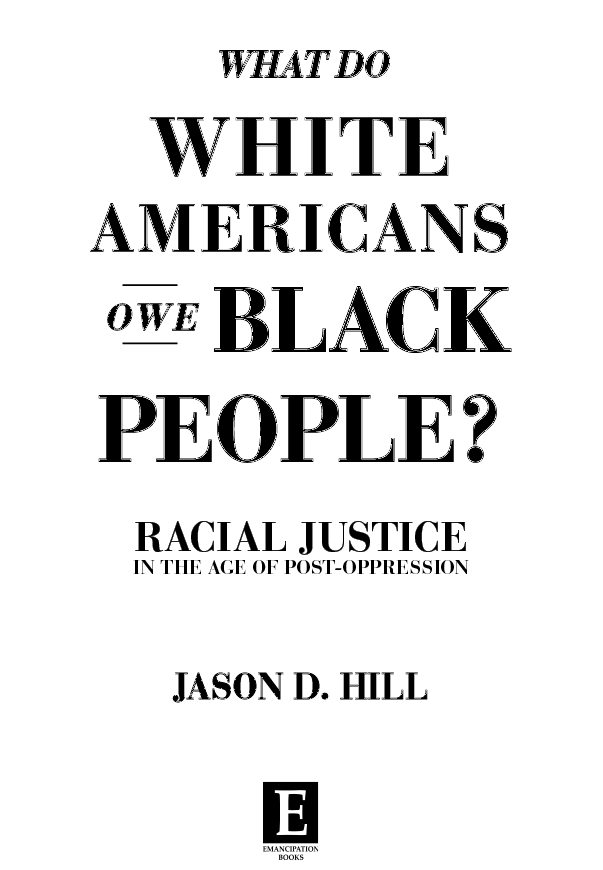
AN EMPANCIPATION BOOKS BOOK
An Imprint of Post Hill Press
ISBN: 978-1-64293-794-7
ISBN (eBook): 978-1-64293-795-4
What Do White Americans Owe Black People?:
Racial Justice in the Age of Post-Oppression
2021 by Jason D. Hill
All Rights Reserved
Cover Design by Tiffani Shea
No part of this book may be reproduced, stored in a retrieval system, or transmitted by any means without the written permission of the author and publisher.

Post Hill Press
New York Nashville
posthillpress.com
Published in the United States of America
The person who sins is the one who will die. The child will not be punished for the sins of the parents, and the parent will not be punished for the sins of the child. Righteous people will be rewarded for their own righteous behavior, and wicked people will be punished for their own w icked ness.
Ezekiel 18:20
To Dr. Bob Shillman
A magnanimous man. A kind and gentle friend.
Contents
A friend of mine told me an apocryphal story that left me with a cold shudder. He is an old-fashioned liberal and a strong advocate of public education; all his children attend public schools. In fact, he is vehemently opposed to the idea of promoting private schools on the premise that they result in a more stratified society because, he believes, poor whites and blacks will be disproportionately disqualified from attending such institutions.
In good faith, he has always entrusted his childrens education to what I had typically referred to as government schools. He was confident that they would receive a robust education.
During the Covid-19 pandemic, however, he was forced to monitor their classroom activities. Unemployment had left him more time to inconspicuously sit -i n , especially on the classes of his sixth grade son.
One afternoon, he was shocked to come upon an assignment being conducted during an English class in which all the white students in the Zoom course were required to place their arms beside a brown paper bag. (How his son had acquired a crisp, brown paper bag was a mystery to him.) The teacher asked them if they noticed a difference in color between their skin and the brown paper bag. All of the white students nodded, and some verbally assented. The teacher then asked if the color of the bag looked close to the color of some of their classmates who identified as black. His son peered at the screen and raised the icon button identifying his acknowledgement. The teacher then announced the following with full moral rectitude and intransigence:
If your skin color is different from the color of the paper bag, then you are part of a problem in America known as systemic racism that does irreparable harm to all black and brown people in America. Further, if your skin color is different from the brown paper bag and you identify as white, you enjoy something called white privilege, which means you are practicing racism every day without knowing it.
Each student that had different color skin than the brown paper bag bore a collective guilt. The teacher then went on to ask the class if they had ever heard the term reparations.
Out of some sense of visceral, atavistic paternal protection, my friend slammed down his sons computer and told him to go to his room for a while. He said he stood with his fingers pressed into the metal cover of the computer, shaking with incredulity.
I explained to him that guilt implied wrongdoing and thatbecause his son at age twelve had committed no egregious harm against any black personhe would eventually grow to feel a sense of resentment. Over time, as his mind grew more focused and the charges against him had been codified into a cultural norm, he would feel that he was the real cause of all harms directed at black people. I told him that something evil and sinister was going to take root in his sons psyche.
My friend grew alarmed, but I pressed on. His son, I told him, would grow to feel resentment towards black people. It would be mild at firsta contemptuous discharge fueled by a growing sense of his superiority and empowerment that he, by the power of his whiteness, could cause so much harm and that he, by that same magical power of whiteness, could alleviate the misery and suffering of blacks. I told him it would not end well, and his sons curriculum would continue to include a phalanx of black and white progressive nihilists who would call for the annihilation of whiteness, which his mind would come to understand as the annihilation of all white people, including himself.
His son, I told him, runs the risk of not only becoming a racist, but a white supremacist. He will come to believe that becoming a white supremacist will be his only default position from which to protect his life from the assault being waged against itstarting with the seemingly benign comparison between his skin color and that of a brown paper bag. And all this would come from white liberals masquerading as anti-racists.
Next page
